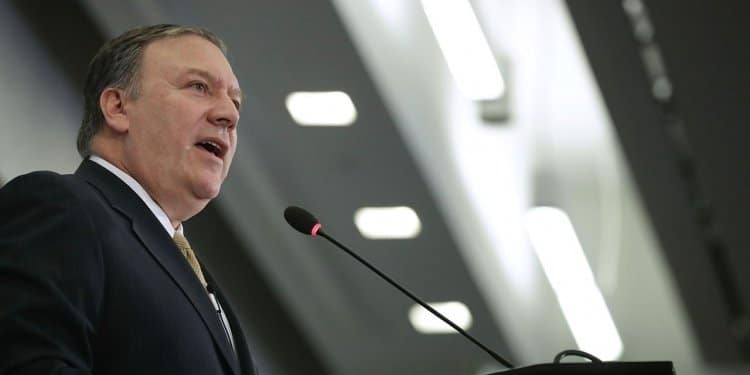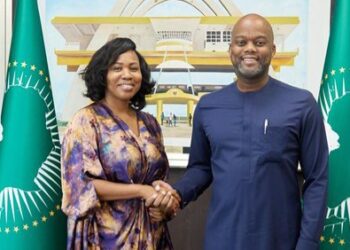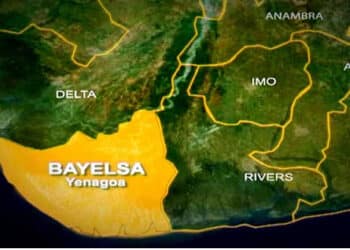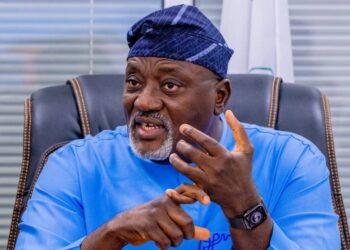THE Christian Association of Nigeria (CAN) has hailed the United States government for placing Nigeria on a Special Watch List (SWL) of countries that have engaged in, or tolerated “severe violations of religious freedom.”
The Guardian reports the President of the Association, Rev Dr. Samson Ayokunle, yesterday, saying that sincere appraisal of the untold hardship Christians are going through in the country, especially in states such as Kaduna, Benue, Plateau, Adamawa and Taraba justifies the decision of the US government, as Christians living in those states were being slaughtered like rams by the Boko Haram terrorists, and killer herdsmen while the security agencies appear powerless and government lacks the political will to deal with the criminals.
This came two days after the action of the United States government.
He said: “In Southern Kaduna, for months, Christians were being killed in their communities, their property were burnt and their lands were confiscated, but till today, those who were responsible for those carnage and genocide are yet to be brought to book. Some suspects paraded by the Police were later set free. A Christian traditional ruler was killed while returning from Kaduna State and his subjects, who were protesting against the evil deed were reportedly punished severely by security agencies.”
According to him: “The same narrative occurred in Benue, Plateau, Adamawa and Taraba states, where criminal herdsmen invaded predominantly Christian communities killing, maiming and burning their property and confiscating them. Till today, those who were responsible are still at large as if they were spirits. To compound the problem, some of their victims are being arrested and detained by the Police for weeks. In Benue State, there were cases of mass burial as if the affected communities were at war.”
Ayokunle said that another thing that could be responsible for the US’ government’s action is the lopsided appointments in the polity, which makes it look as if the government is against Christians.
He added that in previous meetings between CAN and President Muhammadu Buhari, “the association made it abundantly clear to him that the lopsided appointments of his government in favour of a religion and a section of the country was unacceptable. Although he promised to look into the observation with a view to addressing it, what we are seeing and hearing about the government is the continuation of the lopsided appointments.”
The CAN President observed that there are enough evidence to prove that the subtle Islamisation agenda and nepotism are real, adding that 98 per cent of the security chiefs belong to same faith, and come from one part of the country, while all the key appointments that are being made since the second term of the President began follow the same blueprint. “These are facts and they are violations of some portions of the 1999 Constitution (as amended). These include, but not limited to Sections 10, 13 (3-4), 15 (2) (d) and (4). It is widely believed that no country survived two civil wars. Our leaders should be mindful of the complexities of the people they are leading.
“As if those discriminatory policies are not enough, the Chief Justice of Nigeria few days ago called for the amendment to the Constitution with a view to adding more Sharia contents. Since the Chief Justice has not denied the story and the government has failed to call him to order, it is crystal clear that the US government has more facts than the government thinks. We call on the government not to be insensitive to the new development but instead to address all the factors that are responsible,” the CAN president said.
Nigeria’s inclusion in the list of countries that violate religious freedom was announced by the U.S. Secretary of State, Mike Pompeo.
But while the government and indeed Nigerians were still coming to terms with the U.S’s latest action against the country, a Warri, Delta State-based legal practitioner, Otome Adamidenyo informed The Guardian, yesterday, that the country’s blacklisting was long overdue.
Also the Executive Director of the Civil Liberties Organisation (CLO), Ibuchukwu Ezike took a swipe at the President Muhammadu Buhari-led Federal Government for looking the other way while Christians were killed or maimed, and churches razed down in the northern part of the country.
“This is a welcome development. The US has led the way and showed the rest of the world that it is truly a free and democratic society. I call on Europe and the rest of humanity to condemn the religious carnage and discrimination in Nigeria” Ezike told The Guardian on phone.
The U. S. action is coming at a time many Nigerians have criticised the government for its serial violations of the secular status in the country, as provided for in the Constitution.
Several calls and text messages sent by The Guardian to Minister of Information and Culture Alhaji Lai Mohammed, yesterday, did not get any response.
This was after Femi Adesina, Senior Special Adviser to the President on Media informed The Guardian that he was not in a position to comment on the issue, and directed all enquiries on the matter to Mohammed.
“On December 18, 2019, the Department of State re-designated Burma, China, Eritrea, Iran, North Korea, Pakistan, Saudi Arabia, Tajikistan, and Turkmenistan as Countries of Particular Concern under the International Religious Freedom Act of 1998 for having engaged in or tolerated “systematic, ongoing, (and) egregious violations of religious freedom.
“The Department renewed the placement of Comoros, Russia, and Uzbekistan on a Special Watch List (SWL) for governments that have engaged in or tolerated “severe violations of religious freedom,” and added Cuba, Nicaragua, Nigeria, and Sudan to this list,” Pompeo said.
According to Mr Pompeo, the U.S. also designated al-Nusra Front, al-Qa’ida in the Arabian Peninsula, al-Qa’ida, al-Shabab, Boko Haram, the Houthis, ISIS, ISIS-Khorasan, and the Taliban as Entities of Particular Concern.
The 2018 report of the United States Commission for International Religious Freedom (USCIRF), which recommended Nigeria’s designation as a Country of Particular Concern (CPC), noted that religious freedom trended negatively in 2018.
“Religious freedom conditions in Nigeria trended negatively in 2018. The Nigerian government at the national and state levels continued to tolerate violence and discrimination on the basis of religion or belief, and suppressed the freedom to manifest religion or belief.”
The report added that “religious sectarian violence increased during the year, with Muslims and Christians attacked based on their religious and ethnic identity.”
Another case cited is the violation of rights of Shi’a members of the Islamic Movement in Nigeria (IMN).
“The Nigerian military and government continued to violate the religious freedom and human rights of the Shi’a members of the Islamic Movement in Nigeria (IMN). IMN leader Sheikh Ibrahim Al Zak Zaky remained in detention.
“However, in 12 Muslim-majority northern Nigerian states, federalism has allowed the adoption of Islamic Shari’ah law in the criminal codes. The Nigerian constitution also establishes the roles of customary law and Shari’ah courts for Islamic personal law, family.”
Already, U.S. Congressman Chris Smith, welcomed the addition of Nigeria to the SWL. Mr. Smith, who had visited Nigeria to consult with stakeholders on religious freedom, promised that, “we will pay particular attention to Nigeria and the deteriorating situation under the government of President Muhammadu Buhari in the year ahead.”
He added: “President Buhari must address the murderous attacks conducted by Fulani extremists on Christians in the Middle Belt and the oppression of Shia Muslims in Kaduna State.”
Congressman Smith also said during the visit, “I also call upon the State Department to monitor the actions of Miyetti Allah with regard to its complicity in attacks by Fulani extremists.”
As Nigeria struggles for international investment and support to tackle growing insecurity, analysts believe this report could cast a huge slur on government effort in mobilising the required resources to overcome the challenges.










